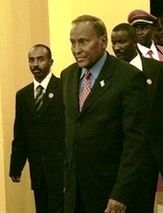Somali rivals arrive to Sudan for peace talks
June 21, 2006 (NAIROBI) — Delegations from Somalia’s transitional government and an Islamic alliance that has seized large parts of the country arrived in the Sudanese capital for peace talks mediated by the Arab League, officials said.
 The head of the delegation from the Islamic alliance, which ousted US-backed warlords from the Somali capital on June 5 after four months of fighting, said it was going into the talks with no preconditions.
The head of the delegation from the Islamic alliance, which ousted US-backed warlords from the Somali capital on June 5 after four months of fighting, said it was going into the talks with no preconditions.
“We have come to the negotiations without any preconditions, with the sole aim of making them a success,” delegation head Ali Mohammed Ibrahim, a prominent Islamic scholar, told reporters on his arrival at Khartoum airport.
Before leaving the Somali capital Mogadishu with his nine-member team earlier on Wednesday, Ibrahim had said: “The Islamic Courts (alliance) will open all avenues for negotiations in order to make the talks a success. But we shall not accept conditions from the government.”
Somali government is represented by the president, the prime minister and the speaker of parliament who will participate to the talks in the Sudanese capital, Khartoum.
Sudanese President Omar al-Beshir, the current chairman of the Arab League, said on Tuesday offered to host talks between Somalia’s transitional government and the Islamist union, known as the Joint Islamic Courts, on bringing peace to their lawless nation in the Horn of Africa.
On the other hand, The Arab League secretary-general, Amr Musa, has arrived in Sudan in order to participate in the Somali reconciliation talks between factions and the Somali government.
The Joint Islamic Courts militia, which has overrun much of southern Somalia, has vowed to reestablish order and begun imposing Sharia Islamic law in the areas it controls. It rejects accusations that is has links with extremists, including Al-Qaeda.
The leader of the Islamic union, Sheikh Shariff Sheikh Ahmed, said of the Khartoum talks: “We do not know the agenda yet but we believe it has something to do with the restoration of peace and stability that we are also trying to bring in Somalia.” He said the Islamists had already restored order to parts of the country under their control.
Somalia’s transitional authority — which sits in Baidoa, west of Mogadishu, because of fears of attacks in the capital — has little real hold over most of Somalia. It accuses the Islamists of plotting to overrun the whole country.
It is unclear how effective the Khartoum peace talks will be since both sides had until Wednesday evening refused to compromise.
On Tuesday, President Abdullahi Yusuf Ahmed said he would not talk to the Islamists until they recognized his government and gave up all the territories they had seized.
For their part, the Islamists accused Yemen and Ethiopia, which are sponsoring the peace talks, of being biased in favour of the Baidoa government.
The Islamic alliance has also vehemently opposed calls from the transitional government and the African Union for the deployment of a regional peacekeeping force, threatening to attack any foreign troops who enter Somali territory.
However, the Islamists said they had accepted Sudan’s offer to host talks because its president was equally opposed to the deployment of international troops in Sudan’s war-torn Darfur region.
The United States, concerned about growing extremism in Somalia, which it fears could develop into a Taliban-like state, has helped bankroll the alliance of secular warlords opposing the Islamists.
But the Islamists defeated the warlords’ union, the Alliance for the Restoration of Peace and Counter-Terrorism (ARPCT), after more than four months of fighting in which at least 360 died and more than 2,000 were wounded, most of them civilians.
In Nairobi, US top diplomat for Africa Jendayi Frazer sought the help of the Joint Islamic Courts to arrest terrorists believed hiding in Somalia.
Washington previously blamed these courts for having links with Al-Qaeda and harbouring foreign fighters and asked warlords as well as the Somali government to help arrest them, but in vain.
“We are making the same call on the Islamic Courts Union, we need to work with all elements,” Frazer told a press conference in Nairobi.
“They need to come together in a dialogue so that they can create a place in which terrorists cannot have a safe haven. We will keep working with the Somali people and I am absolutely convinced that they want us to be there working with them.”
(ST)
